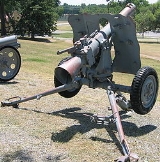
10.5 cm Leichtgeschütz 42
Encyclopedia
The 10.5cm Leichtgeschütz 42, commonly the LG 42, was a German
recoilless gun
manufactured by Rheinmetall
and used during World War II
.
in 1941 spurred the Germans to continue development of recoilless guns
in larger calibers. Krupp
seems to have gotten its 10.5 cm LG 40
into service first, but the Rheinmetall
LG 42 was apparently manufactured in larger quantities.
(light Field Howitzer). The LG 42-1 version was built using light alloys in parts of the carriage, but the LG 42-2 replaced these with ordinary steel as light alloys became too valuable later in the war. Both versions could be broken down into 4 loads for parachute operations.
Nazi Germany
Nazi Germany , also known as the Third Reich , but officially called German Reich from 1933 to 1943 and Greater German Reich from 26 June 1943 onward, is the name commonly used to refer to the state of Germany from 1933 to 1945, when it was a totalitarian dictatorship ruled by...
recoilless gun
Recoilless rifle
A recoilless rifle or recoilless gun is a lightweight weapon that fires a heavier projectile than would be practical to fire from a recoiling weapon of comparable size. Technically, only devices that use a rifled barrel are recoilless rifles. Smoothbore variants are recoilless guns...
manufactured by Rheinmetall
Rheinmetall
Rheinmetall AG is a German automotive and defence company with factories in Düsseldorf, Kassel and Unterlüß. The company has a long tradition of making guns and artillery pieces...
and used during World War II
World War II
World War II, or the Second World War , was a global conflict lasting from 1939 to 1945, involving most of the world's nations—including all of the great powers—eventually forming two opposing military alliances: the Allies and the Axis...
.
History
The development history of the LG 42 isn't clear, but it seems obvious that the success of the company's 7.5 cm LG 40 during the Battle of CreteBattle of Crete
The Battle of Crete was a battle during World War II on the Greek island of Crete. It began on the morning of 20 May 1941, when Nazi Germany launched an airborne invasion of Crete under the code-name Unternehmen Merkur...
in 1941 spurred the Germans to continue development of recoilless guns
Recoilless rifle
A recoilless rifle or recoilless gun is a lightweight weapon that fires a heavier projectile than would be practical to fire from a recoiling weapon of comparable size. Technically, only devices that use a rifled barrel are recoilless rifles. Smoothbore variants are recoilless guns...
in larger calibers. Krupp
Krupp
The Krupp family , a prominent 400-year-old German dynasty from Essen, have become famous for their steel production and for their manufacture of ammunition and armaments. The family business, known as Friedrich Krupp AG Hoesch-Krupp, was the largest company in Europe at the beginning of the 20th...
seems to have gotten its 10.5 cm LG 40
10.5 cm Leichtgeschütz 40
The 10.5 cm Leichgeschütz 40, also called the LG 40, was a German recoilless gun used during World War II. It was manufactured by Krupp.-History:...
into service first, but the Rheinmetall
Rheinmetall
Rheinmetall AG is a German automotive and defence company with factories in Düsseldorf, Kassel and Unterlüß. The company has a long tradition of making guns and artillery pieces...
LG 42 was apparently manufactured in larger quantities.
Design issues
The LG 42 was basically an enlarged and improved version of the 7.5 cm LG 40. It incorporated torque vanes in the jet nozzle to counteract the torque forces imparted by the round engaging the rifling and any clogged or eroded nozzles. It also used the improved priming mechanism developed after the problems with the smaller weapon became apparent. Like all the German 10.5 cm recoilless rifles it shared shells with the 10.5 cm leFH 1810.5 cm leFH 18
-History:The 10.5 cm leFH 18 was the standard divisional field howitzer used by the Wehrmacht during the Second World War. It was designed and developed by Rheinmetall in 1929-30 and entered service with the Wehrmacht in 1935. Generally it did not equip independent artillery battalions until...
(light Field Howitzer). The LG 42-1 version was built using light alloys in parts of the carriage, but the LG 42-2 replaced these with ordinary steel as light alloys became too valuable later in the war. Both versions could be broken down into 4 loads for parachute operations.

